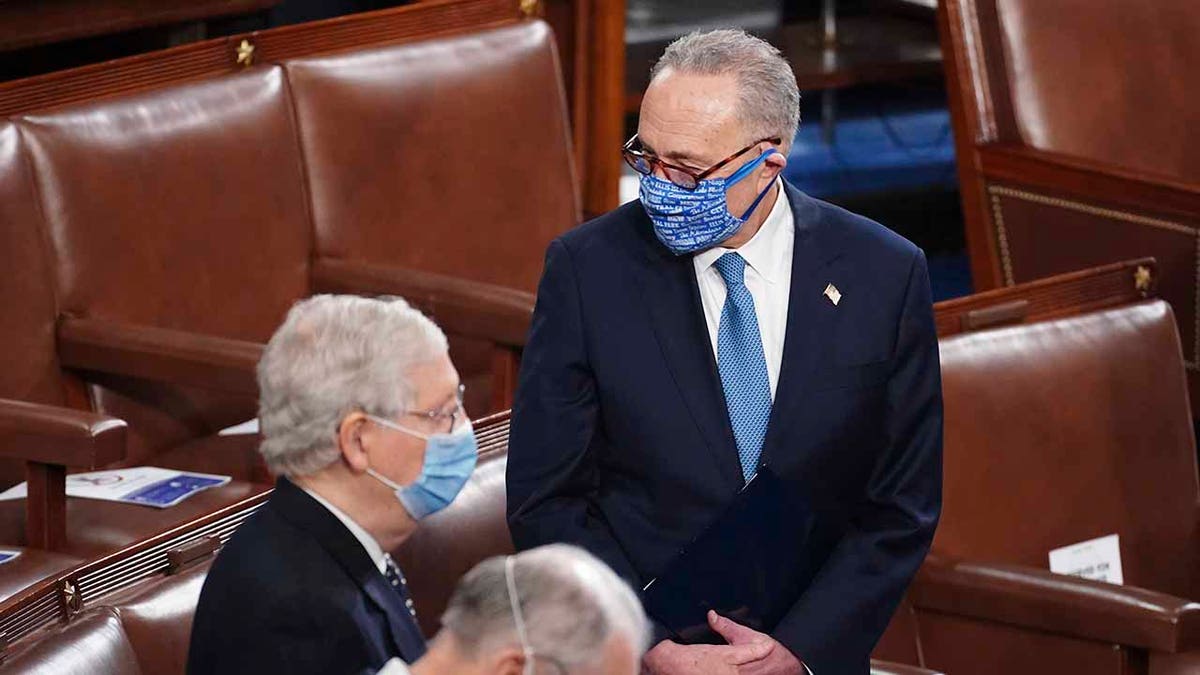VP Harris casts tie-breaking vote to advance budget resolution
Democrats move forward with a $1.9T stimulus package; Griff Jenkins breaks down what's inside the plan.
Senators took 41 roll call votes on a litany of controversial issues during the Senate's marathon vote-a-rama that lasted more than 15 hours from Thursday into Friday -- concluding with a party-line vote to advance the budget resolution and set up a filibuster-free process for Democrats to pass coronavirus relief without GOP help.
Republicans in the 50-50 Senate with Vice President Harris as the tiebreaking vote didn't have the juice to stop the chamber from moving ahead under a process called budget reconciliation. But they did manage to force Democrats into uncomfortable votes all night.
"We're going to put senators on the record," Senate Minority Leader Mitch McConnell, R-Ky., said Thursday ahead of the all-nighter. "Expect votes to stop Washington from actively killing jobs during a recovery — like terminating the Keystone pipeline; that job-killing, one-size-fits-all minimum wage hike; and whether to bar tax hikes on small businesses for the duration of this emergency."

Senate Minority Leader Charles Schumer, D-N.Y., stands with Senate Majority Leader Mitch McConnell, R-Ky., as a joint session of the House and Senate convenes to confirm the Electoral College votes cast in November's election, at the Capitol in Washington, Wednesday, Jan. 6, 2021. The pair -- and the other 98 senators -- pulled an all-nighter for a vote-a-rama Thursday into Friday. (Kevin Dietsch/Pool via AP)
Senate Majority Leader Chuck Schumer, D-N.Y., meanwhile hit Republicans for pushing "messaging amendments" to "score political points."
Among the other high-profile issues Senators were forced to vote on during the vote-a-rama were court-packing, oil and gas leasing, religious freedom, abortion, immigration, and getting kids back in schools.
There were also a handful of voice votes, most notably one backed by Sen. Joni Ernst, R-Iowa, in which the Senate opposed any minimum wage hike during the pandemic.
Here's a guide to all of the votes that the Senate took during the vote-a-rama, some of which will likely be making appearances in 2022 campaign ads.
50-50 votes
With the Senate evenly split, 16 of the votes were 50-50 along party lines. Those that passed received tie-breaking votes from Harris. Those that failed did not.
-Sen. Tim Scott, R-S.C. introduced an amendment supporting the reduction of federal money going to states where there's an investigation into underreported nursing home deaths. It did not pass.
-Sen. Roy Blunt, R-Mo., introduced an amendment opposing coronavirus relief funding for schools that don't reopen after teachers had a chance to get the coronavirus vaccine. It did not pass.
-Sen. Pat Toomey, R-Pa., introduced an amendment opposing sanctuary cities. It did not pass.
-Sen. Lindsey Graham, R-S.C., introduced an amendment supporting former President Trump's remain in Mexico program. It did not pass.
-Sen. Ron Johnson, R-Wis., introduced an amendment supporting the continued construction of the border wall. It did not pass.
-Sen. Mike Lee, R-Utah, introduced an amendment opposing the violation of free exercise of religion. It did not pass.
REPUBLICANS PUT DEMOCRATS ON THE SPOT OVER STIMULUS CHECKS, TAXES IN MARATHON 'VOTE-A-RAMA'
-Sen. Tom Cotton, R-Ark., introduced an amendment opposing court-packing. It did not pass.
-Sen. Bill Cassidy, R-La., introduced an amendment to oppose coronavirus stimulus payments for prisoners. It did not pass.
-Lee introduced an amendment opposing the Biden administration's decision to limit oil and gas leasing on federal lands. It did not pass.
-Sen. Rick Scott, R-Fla., introduced an amendment supporting border security and immigration enforcement. It did not pass.
-Sen. Mike Crapo, R-Idaho, introduced an amendment to support making the 2017 tax cuts permanent. It did not pass.
-Sen. John Hoeven, R-N.D., introduced an amendment to oppose federal carbon taxes. It did not pass.
-Sen. Marco Rubio, R-Fla., introduced an amendment that also supported the remain in Mexico policy, called the Migrant Protection Protocols. It did not pass.
-Sen. Chuck Schumer, D-N.Y., introduced an amendment to strip away three GOP-sponsored amendments that had passed earlier in the night with bipartisan majorities. Those amendments opposed stimulus checks for illegal aliens, opposed Biden's decision to cancel the Keystone XL Pipeline and supported fracking. Harris cast a tie-breaking vote in support of Schumer's amendment and it passed.
-McConnell, R-Ky., introduced an amendment to undo Schumer's amendment. It did not pass.
-The Senate was also split 50-50 on the final adoption of the resolution. Harris cast the tie-breaking vote and it passed
GOP wins
Republicans did in some cases get Democrats to join them in passing amendments, meaning that the House will have to vote on the modified budget resolution later Friday.
-Sen. Roger Wicker, R-Miss., introduced an amendment supporting funding for restaurants and bars hurt by the pandemic. It passed 90-10. Republican Sens. Braun, Lee, Toomey, Cruz, Paul, Tuberville, Daines, Sasse, Lankford and Scott all voted against it.
-Rubio introduced an amendment opposing tax increases on small businesses during a pandemic. It passed 100-0.
-Sen. Todd Young, R-Ind., introduced an amendment opposing stimulus checks for illegal immigrants. It passed 58-42. Democrat Sens. Hassan, Hickenlooper, Kelly, Manchin, Peters, Sinema, Stabenow, and Tester all voted for it. All of those Democrats, however, later reversed their position and voted for the Schumer amendment that stripped away the Young amendment. They then doubled-down on their reversal when they voted against the McConnell amendment.
-Sen. John Barrasso, R-Wyo., introduced an amendment supporting funding for public schools in states hurt by Biden's ban on oil and gas leasing on public lands. It passed 98-2. GOP Sens. Lee and Paul voted against it.
-Sen. Ben Sasse, R-Neb., introduced an amendment supporting proper care for babies who survive abortions. It passed 52-48. All Democrats but Sens. Casey and Manchin opposed it.

Vice President Kamala Harris listens as President Joe Biden delivers remarks on the economy in the State Dining Room of the White House, Friday, Jan. 22, 2021, in Washington. She cast multiple tie-breaking votes on Friday morning. (AP Photo/Evan Vucci) ((AP Photo/Evan Vucci))
-Ernst introduced an amendment supporting the imprisonment of illegal immigrants charged with violent crimes. All Democrats but Manchin and Independent Sen. Angus King of Maine, who caucuses with Democrats, opposed it.
-Sen. Susan Collins, R-Maine, introduced an amendment supporting funding for medical providers, especially rural hospitals. It passed 99-1. Only GOP Sen. Lee opposed it.
-Sen. Mike Braun, R-Ind., introduced an amendment opposing fracking bans. It passed 57-43. Democrat Sens. Bennet, Casey, Heinrich, Hickenlooper, Lujan, Manchin and Tester all voted for it. They all reversed their positions later and voted for the Schumer amendment that stripped the Braun amendment from the resolution. They then doubled-down on their reversal when they voted against the McConnell amendment.
VP HARRIS CASTS TIE-BREAKING VOTE TO ADVANCE BUDGET RESOLUTION
-Sen. James Inhofe, R-Okla., introduced an amendment supporting leaving the U.S. Embassy in Israel in Jerusalem. It passed 97-3. Democrat Sens. Warren, Sanders and Carper opposed it.
-Sen. Steve Daines, R-Mont., introduced an amendment opposing the Biden administration's move to cancel the Keystone XL Pipeline. It passed 52-48. Democrat Sens. Manchin and Tester supported it. They both later reversed their positions and voted for the Schumer amendment that stripped the Daines amendment from the resolution. They then doubled-down on their reversal when they voted against the McConnell amendment.
-Sen. John Cornyn, R-Texas, introduced an amendment supporting funding for police. It passed 100-0.
-Sen. Shelley Moore Capito, R-W.Va., introduced an amendment supporting a Trump-era EPA rule on what constitutes Waters of the United States, which leaves out groundwater from the definition. It passed 51-49. Manchin voted with Republicans in favor of the amendment.
-Sen. James Lankford, R-Okla., introduced an amendment supporting equal treatment of religious entities as compared to secular entities, and cutting federal funds from local governments that do not treat houses of worship equally to secular businesses. It passed 51-49. Manchin voted with Republicans in favor of the amendment.
-Sen. Mitt Romney, R-Utah, introduced an amendment supporting the creation of special committees to address the solvency of federal trust funds including those for Social Security and Medicare. It passed 71-29. You can see which 29 Democrats voted against the amendment here.
-Lee introduced an amendment supporting the expansion of health savings accounts. It passed 53-47. Democrat Sens. Kelly, Sinema and Manchin voted with Republicans.
-Sen. Dan Sullivan, R-Alaska, introduced an amendment supporting the expansion of natural gas use in the U.S. It passed 51-49. Manchin voted with the Republicans.
Democrat wins
A handful of amendments introduced by Democrats passed as well. And in some cases, Republicans broke from their party and voted with Democrats against amendments proposed by Republicans.
-Sen. Joe Manchin, D-W.Va., introduced an amendment supporting targeted stimulus payments and opposing stimulus payments for "upper-income taxpayers." It passed 99-1. Paul opposed it.
-Sen. Ben Cardin, D-Md., introduced an amendment supporting a public vaccine awareness campaign. It passed 100-0.
-Sen. Jeanne Shaheen, D-N.H., introduced an amendment supporting domestic violence and child abuse interventions. It passed 100-0.
-Sen. Chuck Grassley, R-Iowa, introduced an amendment opposing SALT cap repeal. It failed 51-49, with GOP Sen. Paul joining the Democrats.
-Paul introduced an amendment supporting a "penny plan" aimed at balancing the federal budget. It failed 29-71. All Democrats opposed the amendment. You can see the 29 Republicans who supported the Paul amendment -- and those who did not -- here.
-Sen. John Kennedy, R-La., introduced an amendment to deny Small Business Administration stimulus funds to anyone convicted of riot-related crimes. It failed 49-51. GOP Sen. Collins opposed it.
CLICK HERE TO GET THE FOX NEWS APP
-Paul introduced an amendment opposing international infrastructure funding. It failed 8-92. GOP Sens. Blackburn, Lee, Scott of Florida, Braun, Lummis, Tuberville and Hagerty joined Paul in voting for the amendment.
-Cruz introduced an amendment opposing the increase in visas for international workers coming to the U.S. until the economy recovers to pre-pandemic levels. It failed 40-60. GOP Sens. Collins, Fisher, Graham, Murkowski, Paul, Sasse, Scott, Sullivan, Thune and Toomey voted against Cruz's amendment.
-Cruz introduced an amendment on exemptions to biofuel credit caps for refineries during the pandemic. It failed 26-74. Manchin and 24 Republicans voted with Cruz. Meanwhile, 25 Republicans and 49 Democrats voted against the amendment. You can see the full breakdown here.














































